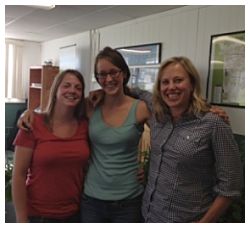
Molly Emmett, ’12, with Lindsey McDonnell and Beth McKellips
Molly Emmett ’12 has been involved in food systems and agricultural security throughout her time at Colgate. As a Peace and Conflict Studies major, she researched and worked directly with communities in Africa and South America on international food security. This background shaped her belief in the importance of becoming immersed in and committed to the community in which she lived and worked, and prompted her to apply for a fellowship through the Upstate Institute. Her placement at the Agricultural Economic Development Program of Madison County (AEDP) has suited her passions and skills and allowed her to immerse herself in Central New York after studying abroad for a year while at Colgate.
The AEDP is part of both the Cornell Cooperative Extension and the county government. It began in December 2006 after the Madison County Board of Supervisors approved funding for an Agricultural Economic Development Specialist. The AEDP seeks to “maintain, develop, and promote a viable agricultural economy that benefits Madison County.” To materialize this vision, the organization focuses primarily on marketing Madison County’s agricultural products and services by creating market opportunities and encouraging value-added enterprises. It also works to maintain a sufficient agricultural land base by assisting existing Madison County farmers and attracting and supporting new farmers.
One of Molly’s main projects was to create a business toolkit for farmers who have been farming for three to ten years. According to Molly, these middle scale farmers “are often left without the attention and resources offered new and large scale farmers,” underscoring the significance of the toolkit’s creation. She researched a number of topics to include in the toolkit, with the goal of supporting farmers working to improve their business operations, particularly in the area of value-added marketing. Topics included social and digital media practices, how to work with distributors, direct and wholesale sales, government and private funding sources, insurance and food processing regulations, infrastructure investments, hiring, and the formation of cooperatives. In order to compile this diverse array of information, Molly emailed, called, and visited farmers, academics, extension employees, and distributors related to the specific topic she researched each week. She simultaneously absorbed new content, as well as areas in which informative resources are scarce.
Molly spent the remainder of her time assisting with the organization and advertisement of Madison County’s annual Open Farm Day. On Saturday, July 27, 39 farms were open to the public for touring, sampling, and animal petting. Molly organized materials for farmers to use on Open Farm Day, as well as a picnic a few days before the event during which farmers and volunteers met one another and finalized logistics for the day. She also advertised the event on various social media and website outlets. The day was a huge success, with a great turnout of tourists, volunteers, and rain showers!
Nearing the end of her fellowship, Molly feels she has absorbed a great deal about ways in which farmers can maintain and expand their practices, as well as remain connected to the rest of the community. Creating the toolkit taught her about the intersection of farming and business, particularly “the challenges and nuances of navigating food systems for farmers, distributors, and consumers.” The AEDP staff has been particularly influential in her learning process. Molly describes the staff as “…passionate about local food, and driven to work with and assist local farmers.” Their passion and commitment helps materialize the organization’s goals and the need “to match those goals with both structural processes of the food system and farmers’ needs, wants, and farming philosophies.”

